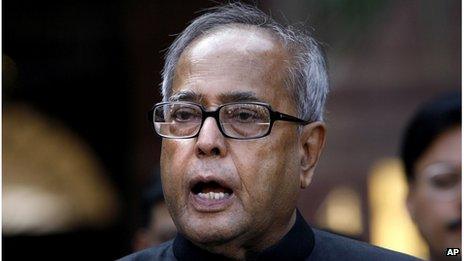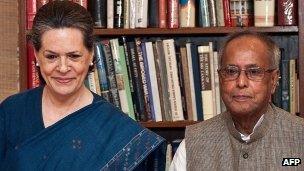Pranab Mukherjee's chequered career
- Published

Economists and business leaders blame Mr Mukherjee for policy paralysis
Was Pranab Mukherjee India's worst finance minister?
During his tenure at North Block, the stately Delhi building which houses the finance ministry, India witnessed an economic growth rate of 5.3% in the last quarter of 2011-12, the lowest in the past nine years.
The rupee fell to its lowest ever level, global rating agencies threatened to downgrade the country, the fiscal deficit went out of control, and a lack of political consensus derailed critical reforms.
After Mr Mukherjee presented the <itemMeta>news/world-asia-india-17398007</itemMeta> this year, economist Lord Meghnad Desai said that it was "shocking that a finance minister can ignore all the problems that he faces".
Economists and business leaders blame Mr Mukherjee for "policy paralysis", which has led to a slump in domestic and foreign investment.
The middle class is unhappy over sharp hikes in taxes and fuel prices. The poor are angry about double-digit food inflation and graft in welfare schemes.
There have been unconfirmed reports that Prime Minister Manmohan Singh wanted to ease Mr Mukherjee out of the finance ministry.
Rooted in the past?
However, despite the gloom surrounding the economy, Mr Mukherjee, who may become India's 13th president next month, remained optimistic about the future.
The reason for this probably has roots in his past - he was also the finance minister between 1982 and 1984 when the Indian economy went through trying times.

Mr Mukherjee had to allocate huge sums for Sonia Gandhi's rural employment guarantee scheme
In 1981, India was forced to seek a loan from the International Monetary Fund (IMF) to tide over a foreign exchange crisis.
The IMF expected India to take some harsh austerity measures, which included drastic cuts in subsidies and other government expenditure, as well as reductions in expenses on pro-poor schemes.
Fortunately, within a few years, the economy was back on track.
In his 1984 budget speech, Mr Mukherjee proudly announced that his government had managed without taking the entire IMF loan.
"Belying the prophecies of doom by many a self-styled Cassandra, the economy has emerged stronger as a result of adjustment effort mounted by us...
"We have not cut subsidies. We have not cut wages. We have not compromised on planning... We have not faltered in our commitment to anti-poverty programmes... We have come out of it with our heads high," he said in the 1984 budget speech.
Mr Mukherjee was convinced that this time around too, the economy would revive itself. So, he went ahead with policies which were similar to the ones he pursued in the early 1980s.
For example, a retrospective tax on cross-border mergers and acquisitions, announced in the 2012 budget, was akin to proposals in Mr Mukherjee's 1983 budget.
Taxes were hiked on cigarettes this year, as the finance minister did with tobacco products in his three budgets in the 1982-84 period.
Apart from this baggage of the 1980s, Mr Mukherjee was bogged down with the decisions taken in the recent past by his predecessors.
For instance, he had to allocate huge amounts of money for the landmark rural jobs guarantee scheme which had the blessings of the Congress party president Sonia Gandhi and her son, Rahul.
In a similar manner, he was not responsible for the various scandals - the selling of telecoms spectrum and coal and the organisation of the Commonwealth Games - which have rocked the government in recent times.
But their ghosts hounded Mr Mukherjee and the government, which was gripped by inaction and an inability to take decisions.
The end result was that the finance minister had no leverage to push through decisions which could have improved the negative economic sentiments.
Mr Mukherjee was, thus, criticised by many as the worst finance minister since India unleashed economic reforms in 1991.
- Published21 June 2012
- Published15 June 2012
- Published25 January 2012
- Published10 February 2011
- Published13 June 2012